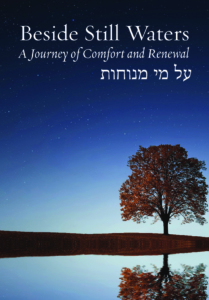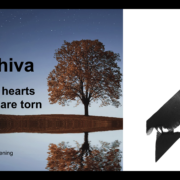Rabbi Jack Riemer reviews Beside Still Waters
Rabbi Jack Riemer reviewed our first print publication, Beside Still Waters, for the February 2020 edition of the Berkshire Jewish Voice. The review is reprinted below. Buy copies from your favorite bookseller or directly from Ben Yehuda Press, where you can also get a large-print edition. (Discounts are available for bulk orders of 10 or more.) Deep thanks to R’ Riemer for the review and to the Berkshire Jewish Voice for publishing it!
 Beside Still Waters: A Journey of Comfort and Renewal
Beside Still Waters: A Journey of Comfort and Renewal
Meditations on mourning and mortality, edited by Rabbi Rachel Barenblat of Congregation Beth Israel
Reviewed by Jack Riemer
For most of us, prayer is a closed world. Some of us know Hebrew, and some of us know the melodies and the choreography that go with the prayers, but who among us knows how to speak to God in prayer? Most of us are fairly good at keeping up with the service, but who among us knows what it means to pour out our souls to God? And yet, ever since the day when Hannah went into the Sanctuary alone, that is what prayer means according to the Jewish tradition.
Some of the meditations in Beside Still Waters: A Journey of Comfort and Renewal, a collection of “liturgy both classical and contemporary for different stages along the mourner’s path” edited by Rabbi Rachel Barenblat, fill a real need.
Ours is a death-denying culture, in which we are taught to ignore the oncoming of death so as not to make those around us feel uncomfortable. And so it is good to have a few different versions of the Vidui here, which is the prayer that we are supposed to say before we die.
Ours is a culture that tries to repress pain and anger, and so it is good to have a prayer to say in memory of someone who has hurt us, and whom it is hard to forgive.
Ours is a society in which most of us stand before the yahrtzeit candle with no idea of what to say, and so it is good to have a meditation for this sacred moment that can help us give expression to the feelings that we have inside.
Most of us mark the end of a year of saying kaddish by hosting a breakfast for the minyan, or by promising to stay part of the group, even though we know that we won’t, and so it is good to have a prayer available in which we speak to the one for whom we have mourned and still mourn, and wish that person an ascent to a new level of holiness, and in which we promise that the one for whom we have recited kaddish is and will continue to be a part of our lives.
Space permits just a few examples of passages that spoke to me.
On the Amidah
I have never been comfortable with the version of the first blessing in the Amidah that ends “pok’ed Sarah” – if, for no other reason, than because “pok’ed” in the Bible often means to punish. And so I am pleased to find “ezrat Sarah” in this book, instead, because it means “Sarah’s helper,” which makes a perfect parallel to “magen Avraham” (Abraham’s shield).
On Prayers of the Shema
Blessings to Zalman Schachter-Shlomi who, in the years before most of us had ever even heard of global warming or climate change, rendered the second paragraph of the Shema as a prophecy of what would happen if we continued to mistreat the Earth. Thanks to him, the “Vihaya im Shamoa,” which used to make us uncomfortable because it sounded like a threat from God who controls the rain, now speaks directly to our souls. What once seemed like a prayer that was far behind the times now reads like a prayer that is ahead of our times.
We owe much to the poet who gives us a fresh version of the “V’ahavta” blessing of the Shema in this collection. We owe whoever it was for the phrase: “with every heartbeat, with every breath, with every conscious act” simply because it is so much more alive than the “with all thy heart, with all thy soul, and with all thy might, ” which we have been saying for so long that we no longer hear it.
And how much more alive are these words:
“Teach them to your children, talk about them at work,
Whether you are tired or when you feel rested.
Let them guide the work of your hands;
Keep them in the forefront of your vision.
Do not leave them at the doorway or outside your gate.”
Let me be clear: This text is not meant to replace the standard one. On the contrary, it only works if you know the original version, so that you can understand why the poet speaks of the work of your hands, or the forefront of your vision, or of the doorway to your house, each of which echoes a passage in the traditional prayer book. It is living midrash that the author is creating here – not a substitute for the text that we grew up with.
On Ma’ariv Prayers
We have said the prayer that thanks God for bringing on the evening so many times by now – both in Hebrew and in English – that it no longer helps us feel much awe at the setting of the sun. And so, I welcome this version of the prayer for the setting of the stars, a brief excerpt from which I cite below:
“The sun wheels over the horizon
Like a glowing penny falling into its slot.
Day is spent, and in its place the changing moon,
The spatterdash of stars across the sky’s expanse.”
There is more in this collection, including some pages that do not touch me and some that may not move you. But try it for yourself, and you may find in it echoes of moments when the soul of the writer danced or yearned or sighed or sung or screamed with pain. And you may find some pages that will stir you to do the same.
Rabbi Jack Riemer is the editor of New Prayers for the High Holidays and the three volumes of The World of the High Holidays, and of two new books of Jewish thought: Finding God in Unexpected Places and The Day I Met Father Isaac in the Supermarket.
BESIDE STILL WATERS, A Journey of Comfort and Renewal is published by Bayit: Building Jewish and Ben Yehuda Press, Teaneck, NJ 2019. It is available on Amazon or directly from the publisher, and costs $18. (Discounts are available for bulk orders of 10 or more at the publisher’s website.)





